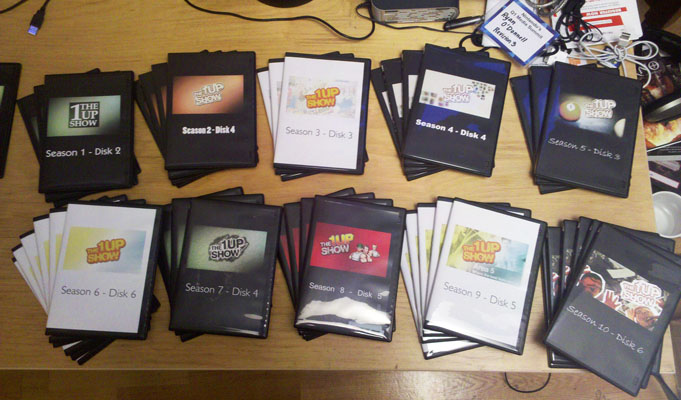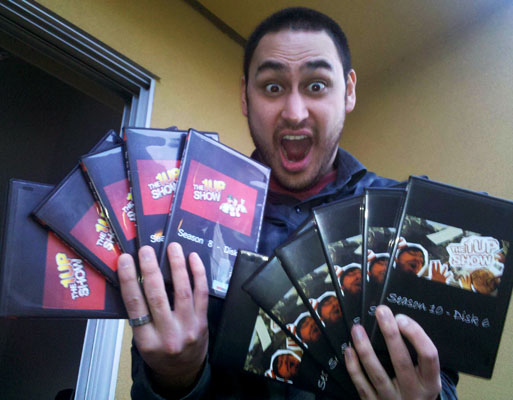Phil Fish was kind enough to ask me to participate in the Indie Gamemaker Rant at GDC 2010. I was delighted to be invited, especially considering I'm not an indie game developer. At first I planned to talk about how small development studios should document their process, and essentially, do their own press. But Phil told me that the audience would've heard that before.
I decided to speak about my feelings concerning the gaming press instead. A few weeks ago, I sat down to write some notes on the subject. Two hours later, I had written a full speech. I tried -- and failed -- to memorize it in time for the session. The entire text, almost exactly as I read it from my phone in front of the live audience, follows below:
 Photo courtesy of Official GDC on Flickr.
Photo courtesy of Official GDC on Flickr.
I know many of you here are indie game creators. I am not one of you. I've been a member of the gaming press for the past ten years, first as a freelancer, then on the editorial and video teams at GameSpy.com, IGN.com, and 1UP.com where I co-created the 1UP Show. I'm now a part of the independent company AREA 5, where I make videos about games.
In general, the gaming press drives me nuts. So much of the writing is garbage, isn't it? When I read a piece that uses proper grammar and punctuation, it's surprising; isn't that sad? Quality, process and copy editors have been set aside in the name of immediacy and 24-hour-a-day coverage. It's no surprise. It's the same shift that's happened to media at large. It's sad.
The worst part is that I still care. Maybe I'm stupid. Maybe it's crazy to think that the most interactive and modern art form on the planet needs to be picked at and pulled apart by writers, radio and video producers, and fellow game creators with a vast knowledge of the medium. Maybe I'm crazy to think we need to pay these termites talk about their insights from a late night online gaming session or how No More Heroes relates to French New Wave cinema. Maybe I'm nuts to think we should give them open access to studios to let them dissect the game design process and write about it. Would it be insane to let them burrow through the craft, peek at its insides, focus on its intricacies and help us all see how it works? I know. I'm crazy. I want people to dig through it all so that we can learn from their findings and have a document of the triumphs, the growing pangs, and mundanity of our medium in its infancy. I won't apologize for it, though. That's what I want: an industry with space for real critics.
But since I started working as part of the gaming press ten years ago, the number of quality gaming outlets with a budget has gone down, not up. The number of writers I respect has increased, but the vast majority of them have moved from editorial teams into game development. And it makes sense: games benefit from great stories. Publishers need tastemakers to build their communities. And most importantly, these writers have families and need to be paid an honest wage to survive. But when the potential subject of these former critics' work is a single game rather than all of them, the number of checks and balances in our system decreases. Even if what they write is only subtlety influenced by the corporation calling the shots, it still is. Not only are we losing all this potentially great, moving, and insightful game criticism, we're losing the ability to keep our industry honest.
The largest of the editorial outlets will continue to survive based on the quality of their SEO, the number of users on their messageboards, and the quickness with which they can post the latest media assets from the biggest AAA games. They don't want or need to enable the best of us to act as curators of the medium while also aiding us in paying our rent. Their dot-com-boom-esque staff sizes, huge tech and production teams, and arcane, flash-driven front pages define them. What they pay for all that could be focused into quality editorial work and clean, simple, modern web design. But it's not. Because nobody wants to upheave their own operation if it already pays; and pay it does.
I'm just one disenchanted guy with five minutes to talk. I can't change the way things are. But if I could make a humble request of the gaming press -- one that would cost nothing but a little time and effort on the part of the writers to implement -- it would be this: treat games equally. AAA games. Indie games. iPhone games. There are thousands of great games out there waiting to be discussed. They're all competing against each other for the same thing: our time. Despite their budgets or the number of people involved in their creation, these games are influenced by each other, our culture and and the people who play them. They're all important to the future of the medium. And a lot of them are even fun to play.
Don't limit the scope of your coverage to games with titles you've seen in the press releases filling your inbox. Go out and find new stories yourself. You say: we cover indie games now, dude! I say: bravo. But just covering new releases on XBLA and PSN isn't enough. An indie round-up once a year won't cut it either. Don't compartmentalize your coverage. I'd like to see fewer top ten lists and blogs dedicated to the best twenty iPhone games that came out last week. I love Offworld and TinyCartridge as much as anyone else, but I don't feel those sites have that much of an opportunity to expand the minds of the vast majority of Gears of War players, for example. Their audience will always be limited next to that of the big boys; it's the larger outlets that I want to see mention God of War III, Heavy Rain, Spelunky, Colorbind, and Auditorium all in the same breath. You have the power to turn your readers, watchers, and listeners on to so much more than what's new this week on Xbox 360 if you simply talk about both the big and small games with the same level of commitment, care, and enthusiasm. The scale of your operation gives you the unique opportunity to cover more. This "all games are equal" mantra has worked for my team and I. We're constantly getting Twitter followers and commenters telling us how grateful they are about being turned on to some tiny game they would've missed simply because we included it in the conversation. Put simply: our audience comes for Halo: Reach and stays for VVVVVV.
If we can expand the number and type of games that enter the consciousness of the audience, the diversity of the games themselves will inspire more creative criticism. We can invite more people to care about what the creators we critique create if we can show them just how ambiguous the definition of the word videogame is. Hopefully then we can get back to building our side of the industry into what it should be rather than let it grow into a larger version of what it is now: a vast landscape of consumer reports and the same daily headlines copy-and-pasted across thousands of websites without ever being edited by another pair of eyes -- or a spell checker -- all while our best writers are being picked off or burnt out one at a time. Treat games equally. That would be a baby step in the right direction.


 matt chandronait
matt chandronait




